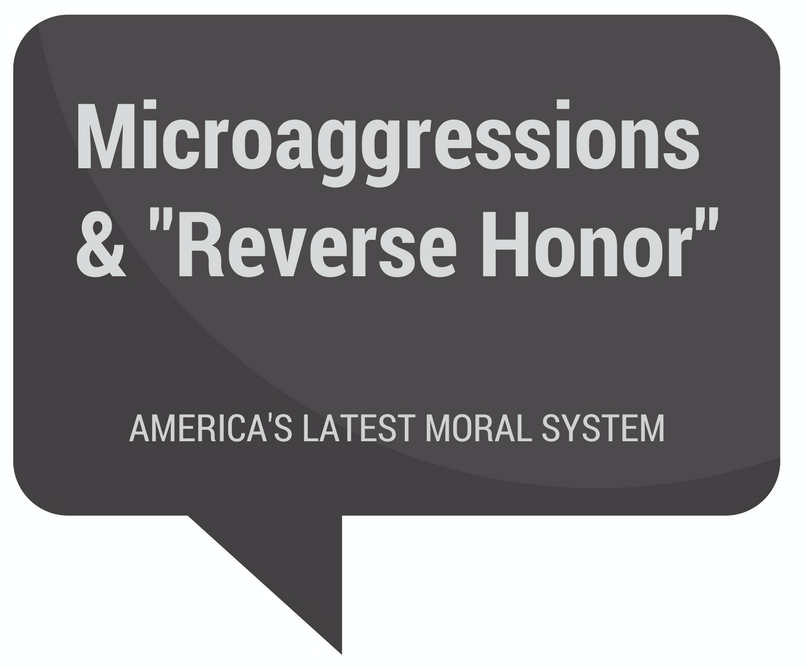Microaggressions and “Reverse Honor”: America’s Latest Moral System
A new moral system has emerged in America. It is shaped by the language of privilege, class, bias, inequality, tolerance, and inclusion. This new moral system has taken definitive expression in the issue of microaggressions.
Microaggressions are “brief, everyday exchanges that send denigrating messages to certain individuals because of their group membership.” Microaggressions are indignities that communicate insults. They are unintentional put-downs, an action or word that suggests otherness or abnormality, a reminder that you are different. Microaggressions subtly shame others. Following are some common examples:
Comments:
- To an Asian, “Where are you really from?”
- To a bi-racial person, “What are you?”
- To a black person, “Wow, you don’t talk like a black person!”
Actions:
- A ministry video that features only white people.
- Non-Hispanics wearing sombreros (aka “cultural appropriation.”)
- A building named after Woodrow Wilson.
You may be thinking, “Seriously! When did those become wrong?” To get a better sense of microagressions, watch this skit: “What kind of Asian are you?”
The New Moral Culture
Microaggressions began as a topic of sociological study in 1973. But within the last few years microaggressions have evolved into “an approach to morality that is relatively new to modern America” (p. 3). Every “moral system” has a way of defining and correcting deviant behavior. Here is how microaggression morality works as a moral system.
Defining deviant: In this new moral culture, “conduct is offensive because it perpetuates or increases the domination of some persons or groups by others.” Any action that promotes inequality or oppresses another cultural group is a microaggression to be publicly condemned. Basically, anything that shames another person is wrong. Shaming others, not transgressing policies or laws, is the new moral basis (see the list of examples above). In this mindset, privilege (the code word for status or honor) risks being a moral deviance because it implies complicity with cultural oppression.
Correcting deviant: The victims of microagressions (often university students) use viral hashtags or websites like Microaggressions.com to openly document offenses against them. They campaign for support in the court of public opinion in order to influence social behavior. The aim is to show that minor actions are part of a larger pattern of injustice and suffering which deserve sympathy.
Here is why I call this new moral system reverse honor. NYU Professor Jonathan Haidt says, “It creates a society of constant and intense moral conflict as people compete for status as victims or as defenders of victims.” Observe the logic of this observation—victims get status; i.e., honor comes from shame. So people emphasize their victimhood because this new moral culture confers social capital upon the most oppressed. This approach creates a race to become the “most shamed” person. Rather than emphasize their authority (i.e., honor) or inner worth (i.e., dignity), the aggrieved emphasize their marginalization and oppression (i.e., shame). The victim has the highest moral status.
3 Ironic Features
In its extreme forms, this moral culture of reverse honor has several ironic features.
- Self-shaming. People who are highly sensitive to being shamed energetically broadcast their shamefulness (victimhood).
- Exaggerated shaming. A nineteen-year-old Harvard student uses his iPhone 7 to tweet how he felt “grossly oppressed” by the classroom discussion about The Great Gatsby. Really, you’re “oppressed”?
- Other-shaming. The response to microaggression mirrors the very injustice the victim bemoans—marginalizing and shaming others.
These apparent ironies contribute to the confusion and backlash surrounding microaggressions.
The Cultural Clash
The controversy about microaggressions is rooted in cultural differences. In America, the dominant group is usually Caucasian-Americans; they understand morality in legal terms of guilt and innocence. The “victims” of microagressions are generally minority groups (e.g., Asian immigrants, African-Americans) that are more honor-shame oriented.
The minority victims say (in some form or another), “You shamed me!” assuming this is a legitimate basis of morality. Minority victims expect the white aggressors to acknowledge their “shaming” (code words: domination, oppression, exploitation) behavior.
The accused majority respond, “I didn’t do anything wrong!” assuming legal innocence is the basis of morality. But this suggestion of moral culpability frustrates people of the dominant, guilt-innocence culture who respond, “I’m not guilty of anything. I’m a good person. It was an innocent comment.”
Traditional Western morality hasn’t viewed wrong as generational or unintentional; crimes (and in Christian theology, “sin”) are personal and willful transgressions.
Competing cultural values create a social impasse—people are unsure how to act. They do not know whether their action will be praised or condemned. Living in a refugee community, I sense this tension whenever I meet someone. I want to engage and welcome the person, but fear it may be marginalizing to ask, “Where are you from?” Do I risk being a microaggressor who slights others, or should I keep silent?
This tension creates conflict, anxiety, and frustration. And we see this moral confusion playing out in massive ways on university campuses and in national politics.
Is the “Reverse Honor” of Microaggressions Biblical?
Yes . . .
- Advocacy for the oppressed and victimized is obviously biblical.
- The use of shame (not just legality) to impact social behavior also has a biblical precedent (Ez 16; 1 Cor 6:5; 2 Thess 3:14).
. . . but No.
- The shaming tactics used in airing complaints are disintegrative and punitive, not reintegrative or restorative. They do not repair relationships or community.
- Christian civility and tolerance means “agreeing to disagree,” not “agreeing with everyone.” The moral cultures based on microaggression complaints stifle substantive discussion.
- The biblical response to offense is forgiveness and restoration, not broadcasting grievances.
The Takeaways
- There is a clash between two competing moral systems. This clash evokes strong emotions from people because it threatens to overturn previous systems for defining right/wrong and human identity.
- Microaggression morality can be beneficial, especially in bringing attention to injustices against minorities. But as a newly-emergent moral system, it clearly has deficiencies that need to be refined for the common good.
Further Reading:
A popular sociological article entitled “Microaggressions and Moral Culture” is summarized here and is clarified in this follow-up article. For a critique of microaggression morality, see also, “The Coddling of the American Mind,” The Atlantic (Sept 2015).



You mentioned that this is a new moral system in the USA. Yet, there was a study done on it in 1973. That is 44 years ago or entire generation ago. So, it is not that new. WHat is called microagression has been happening for years. The targets of it, unless you are a woman, has changed. Look up what Italians, Irishmen, Germans, Hispanics, whites, blacks etc use to be called. This is not just a situation in the US but around the world. I have been a victim of microagression in every country where it was physically obvious that I was a minority. I have been spit at. So, this is not just a new US problem it is a human problem, worldwide and old as sin. Look at what 1 century Jews called Gentiles. I am not saying it is right. You mentioned it is unintentional which means education can help get rid of it. For those of us who experience it almost daily we need to educate people of how it affects us.
To continue: I am not saying in my above comment that the best way to stop micro aggression is by legislating it away that will not help. Nor do I mean we aught to riot because of it. what I mean by educating people is to tell them how it feels. Then leave it there. Have some grace.
I think I am confused at the definition of microaggression. I would not consider spitting at someone in the same category as asking where you are from. This seems to be focusing on the aggressions that are not seen in a right/wrong category. Spitting at someone or groping someone and other such instances are overt aggressions.
Yes, this has been going on for a long time, but what is new is the wider acceptance and the public shaming that is happening (mainly due to social media which has also been discussed on this blog). 50 years ago when someone did a microaggression, there was no public shaming for it (maybe there was?) but today it is a big deal. My daughter, a university student in TX, was telling me a story about a girl who was complaining that a guy held the door open for her. It was a sign of oppression/aggression. So, now the “honorable” act is even seen as shameful by the “victim”.